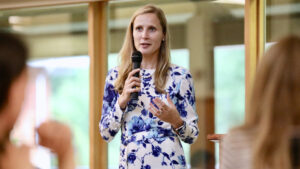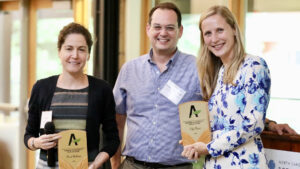News & Stories
Showing CSR is good strategy

Proving that it pays to be green and socially responsible is the lifework of Olga Hawn.
Hawn is an associate professor of strategy and entrepreneurship, the Sustainability Distinguished Fellow and the faculty director of the Center for Sustainable Enterprise at UNC Kenan-Flagler Business School.
Her path to studying sustainability began when she was growing up in Russia. Out of necessity, her parents grew fruits and vegetables, recycled and reused everything they could. That need became a way of life, with their commitment to using resources efficiently deeply ingrained in Hawn as a habit and a point of view.
She became engaged in efforts to help the planet after she studied in Denmark, where she learned about corporate social responsibility (CSR) and realized it could help Russia by boosting the economy and improving life for its people.
Hawn’s first contribution to the field was volunteering to help translate the United Nations Global Compact – which offers 10 principles for helping companies foster a culture of corporate responsibility – into Russian. But after completing the translation and talking to the first companies interested in signing the compact, Hawn quickly realized that convincing Russian companies to sign it without having a business case for CSR would be very difficult.
This revelation led Hawn to pursue a master’s in management research from the Saïd Business School at Oxford University, where she studied how Vodafone engages stakeholders to make practical business decisions that earn profits and make a difference. While at Oxford she also met her husband, a North Carolina native.
 The desire to understand the conditions under which CSR pays led Hawn to the U.S., where she earned her PhD in strategy at Duke. Her first job as a professor at Boston University taught her that CSR needs to be portrayed and taught as a management strategy. In fact, she learned that using “sustainability” as a term to replace CSR was more effective because CSR emphasizes a company’s ethical responsibility, while sustainability asks managers to take a systems view, recognizing that companies are part of a larger social and environmental system, that systems change, and that today’s actions must consider the future.
The desire to understand the conditions under which CSR pays led Hawn to the U.S., where she earned her PhD in strategy at Duke. Her first job as a professor at Boston University taught her that CSR needs to be portrayed and taught as a management strategy. In fact, she learned that using “sustainability” as a term to replace CSR was more effective because CSR emphasizes a company’s ethical responsibility, while sustainability asks managers to take a systems view, recognizing that companies are part of a larger social and environmental system, that systems change, and that today’s actions must consider the future.
Examining what drives CSR
Understanding the drivers of CSR and the different ways it is adopted and implemented as a sustainability strategy are the framework for Hawn’s research. For example, in a study of factors affecting firms’ CSR decisions, she describes their choices as complying or conforming in symbolic ways; complying or conforming in substantive ways; or not taking any action.
As a strategy scholar, Hawn also is interested in how this affects firm performance. For example, in a study of the impact of a gap between internal and external CSR actions – what companies say they do and what they actually do – she found the gap to be correlated negatively with shareholder value.
Her research lies at the intersection of strategy and organization theory, business and society. She tracks the “normalization” of sustainability in business through the Dow Jones Sustainability Index (DJSI) by studying investor reaction to companies being placed or taken off the index. She found that over time investors react more positively to the association with the DJSI.
CSR also plays a role in cross-border mergers and acquisitions of firms from emerging markets. Hawn finds firms that pay little attention to sustainability are two times less likely to seal the deal and, if they do, it takes longer. But those with a positive record on sustainability are seven times more likely to complete the deal.
“What all this shows is that companies from emerging markets are ready to play by the rules of the international community,” says Hawn. “They are not going to come in and hurt the environment in the host country, and they won’t just fire people and ship jobs abroad. This is reassuring for host country stakeholders.”
Her research has gained recognition. Hawn has earned a number of awards, including best paper from the social issues in management division of the Academy of Management and a nomination for the most promising scholar under 40 from the Academy of International Business. For three consecutive years, she won outstanding paper awards from the Alliance for Research on Corporate Sustainability (ARCS).
Ultimately, Hawn wants to explain the “different shades of green” in business today. She is interested in sustainability strategy holistically – from the drivers of adoption of a strategy, to the different degrees of implementation, to the various outcomes.
She is planning a new area of study: examining social issues. She is looking at investor reactions to U.S. corporations’ LGBTQ ranking as well as the effect of the #MeToo movement. Together with UNC colleague Stephanie Mahin, a professor of management and corporate communication, she studies various stakeholder reactions to corporations’ anti-racism statements and the impact of the firms’ commitments to address racism.
Sustainability at UNC Kenan-Flagler
 When UNC Kenan-Flagler asked Hawn to join the faculty, one of the big draws was the School’s interest in her research and its long tradition of teaching and researching sustainable business practices through the Center for Sustainable Enterprise, which dates back to 1999.
When UNC Kenan-Flagler asked Hawn to join the faculty, one of the big draws was the School’s interest in her research and its long tradition of teaching and researching sustainable business practices through the Center for Sustainable Enterprise, which dates back to 1999.
She also appreciated the culture. “Everyone is so friendly here – the Carolina Way is meaningful,” she says. “I live it, too.”
Fortunately, Hawn also teaches what she preaches. In 2016, based on her research, she designed a Sustainability Strategy course, which received two honorable mentions for the Page Prize for Sustainability Issues in Business Curricula.
In 2021 she designed a new course Integrating Sustainability. Believed to the first of it its kind, Hawn was inspired by a sustainability manager tasked with integrating sustainability at Clorox and by the U.N. Roadmap for adopting and implementing a sustainability strategy.
She also teaches a Global Immersion Elective in Sustainability and Social Enterprise. She has guided MBA students during intensive in-country immersions, introducing them to social enterprises and sustainability issues in Chile and Peru in 2018 and Bolivia and Ecuador in 2019.
 Her students appreciate her. They have nominated her for the Weatherspoon Excellence in Teaching awards in both the MBA and PhD programs. In 2019, Poets & Quants selected her as one of the “Best 40 Under 40 Professors.”
Her students appreciate her. They have nominated her for the Weatherspoon Excellence in Teaching awards in both the MBA and PhD programs. In 2019, Poets & Quants selected her as one of the “Best 40 Under 40 Professors.”
Hawn wants students to see under what circumstances it pays off for a company to be socially responsible and how to build these ideas into organizational culture. Her research shows that promises that companies make in sustainability have to follow closely with their actions, or otherwise the market value suffers. Hawn emphasizes these points when mentoring students and counseling them on pursuing careers with impact. She teaches about the mental barriers that CEOs face regarding sustainability and how they can help CEOs overcome them.
Some highlights from Hawn’s class include case studies on how Clorox and Wal-Mart go green; greenwashing by (and tasting of) Fiji Water; visiting Burt’s Bees, which has a zero-waste policy among many other sustainability initiatives; learning how to calculate a company’s carbon footprint; looking at current sustainability research; and introducing how-to guides with step-by-step instructions on addressing sustainability challenges.
In addition, students participate in a simulation where, as senior- or middle-managers, they face an urgent or less urgent challenge: Their clients inform them that they are going to buy only green moving forward. Students must get everyone in the company on board to respond to the challenge and learn about various techniques at their disposal and how hard organizational change is.
Optimistic about the future
Hawn is optimistic about the future – partly based on observing her students’ passion for doing their part to save the planet.
– partly based on observing her students’ passion for doing their part to save the planet.
“They believe in the greater good they are providing,” says Hawn. “Whether we will thank the millennials or older generations for their actions, there is no way back in sustainability – only forward.”
“I truly enjoy teaching and view our profession as one of the very few where we can change the world every day – in the classroom. I chose this career after becoming inspired by my students in Russia, by their desire for knowledge and their eagerness to learn how the business world operates and how we can explain and predict what will happen tomorrow. At UNC Kenan-Flagler, there is nothing more important than to be there for students, and to prepare the future leaders of our world with more ethical ways of thinking about and doing business.”